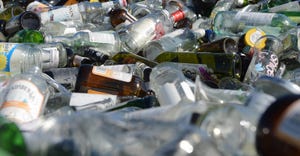New Report Offers Strategies for Improving Recycling of Automotive Plastic Packaging
October 16, 2024

WASHINGTON, -- Suppliers Partnership for the Environment (SP), an association of global automakers and their suppliers, today announced the publication of a new report, "Moving Automotive Supply Chain Plastic Packaging Toward a Sustainable Circular Economy: Full Report and Playbook," developed in collaboration with Resource Recycling Systems (RRS).
Many different packaging materials are currently used in the automotive industry to ship parts damage-free through the supply chain. Returnable containers are a staple in the automotive industry for domestic shipments and the outer container is typically recycled or reused. The internal plastic dunnage – including materials such as foams, films, and other low-weight plastics – poses greater recovery challenges due to factors such as mixed material compositions and the logistics of economically collecting and transporting these materials from different facilities along the supply chain.
"We are committed to driving sustainability across the entire supply chain," said Bridget Grewal, Director, Packaging Continuous Improvement at Magna. "This new report provides valuable insights and practical guidance for increasing the recycling of plastic packaging in the automotive industry, helping us to reduce waste and improve environmental outcomes."
SP commissioned RRS, a sustainability and recycling consulting firm, to conduct a feasibility study and develop a recommended approach for increasing recycling of internal plastic dunnage and packaging. Fisher Packaging was also a part of the team providing expertise in packaging design and plant operations. This newly published report offers comprehensive guidance on implementing programs to manage plastic packaging in the automotive supply chain. It emphasizes the importance of collaboration to consolidate plastic waste, allowing for more efficient recycling solutions at scale.
"By leveraging our technical expertise and deep experience in recycling systems, we helped identify practical solutions for increasing the recyclability of plastic dunnage," said Bryce Hesterman, Senior Consultant at RRS. "SP's leadership and commitment to tackling these challenges truly positions them as the driving force behind meaningful change in the automotive supply chain."
The report outlines actionable steps to divert plastic waste at various levels – within plants, across facilities, and throughout the material recovery value chain – to access recycling markets that promote the highest, best use of materials. While there is no one-size fits-all solution to handling plastic waste, the accompanying playbook provides an approach and framework for individual plants to evaluate opportunities that fit their circumstance considering economic, environmental, and behavioral aspects, and outlines common barriers across the supply chain.
"SP's sustainable packaging initiative was developed to identify new opportunities to minimize automotive packaging waste and seek to address barriers to packaging recyclability and reuse. This study provides important new insights on opportunities for automotive companies seeking to improve economical recovery of key plastic packaging waste streams and increase access to recycling markets that reflect the highest, best use of those materials. We commend Michigan EGLE and Magna for the grant funding provided to support this project," said Kellen Mahoney, Director, Suppliers Partnership for the Environment.
The guidance provided in the report is complemented by several existing SP sustainable packaging resources, including "Sustainable Packaging Specification Recommendations for Automotive Manufacturing Operations", "Sustainable Packaging Specification Recommendations for Automotive Expendable Packaging" and "Automotive NA 48 x 45 Wood Stringer Pallet Specification Recommendations".
The new report is available to download at no cost at: https://www.supplierspartnership.org/plasticpackagingstudy/. The study was supported through grant funding from the Michigan Department of Environment, Great Lakes, and Energy, with matching grant funding provided by Magna.
You May Also Like
.png?width=300&auto=webp&quality=80&disable=upscale)

